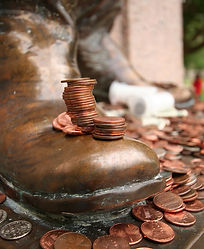Philanthropy
Pre-Conference Philanthropy
Penny Wars!
In support of this organization and its mission to blaze new trails for disadvantaged youths, SWACURH 2015 would like to coordinate Penny Wars as the preconference event from which all donations would be directly given to students.
-
Penny Wars is a game in which you compete to attain as many points as possible during the “war”. One point will be awarded to a team for each penny they collect, however if any currency that is not a penny is added to their collection, that amount will be deducted from their total (Example: $1 = -100 points, $0.50 = -50 points).
-
We suggest that the “battle” may be conducted between residence halls, sides of campus, floors within residence halls, or within any sub-community on campus. Each team must have a jar to collect the money during the war, and must be placed in a permanent location.
-
Before coming to the conference, the total monetary amount collected during Penny Wars must be calculated. The collection may be brought directly to the conference (in rolls if at all possible) or donated via a cashiers check made out to TAMU RHA. The total amount collected will then be taken into account for final Spirit and Awards in small and large school categories.

Conference Philanthropy
Project Linus
Project Linus collects and distributes blankets to children in hospitals, shelters, social service agencies, or anywhere a child is in need. Often the recipients are seriously ill, traumatized, or otherwise in need of new blankets.
A secondary goal of Project Linus is to provide a rewarding and fun service opportunity for interested individuals and groups in local communities, for the benefit of children.
During the conference, students will be creating hand-tied fleece blankets which will later be distributed nationally.
For more information, please refer to Project Linus’s website http://www.projectlinus.org.

Penny War Donation Receiptants
National Association for Urban Debate Leagues
Each year high school debaters throughout the country debate a single complex policy question, or resolution for the entire year. Coached by teachers, debaters conduct extensive research on the resolution and develop arguments for and against it. Debaters are able to practice after school practices and competes at weekend tournaments.
Urban Debate Leagues were recreated after years of cost cutting in urban public schools. Leveling the playing field, urban debate programs give urban students access to the same academically rigorous debate programs available to their suburban peers. Often low achieving with a history of disciplinary problems, urban debater students receive opportunities to collaborate and effectively think which they would not otherwise receive. 86% of urban debaters are students of color and 76% are from low-income families.
Students are dramatically changed by their participation in debate leagues, and the effect alters their course both academically and socially. Research has shown that
-
72% of urban debaters with the highest risk of dropping out graduate on time.
-
Each semester that a student debates, his/her grade with improve
-
Debaters are more likely to test as college ready.
-
After graduating from high school, 86% of urban debaters enroll in college.
-
Urban debaters are 80% more likely to graduate from college.
For more information about National Association for Urban Debate Leagues, reference http://urbandebate.org/.

